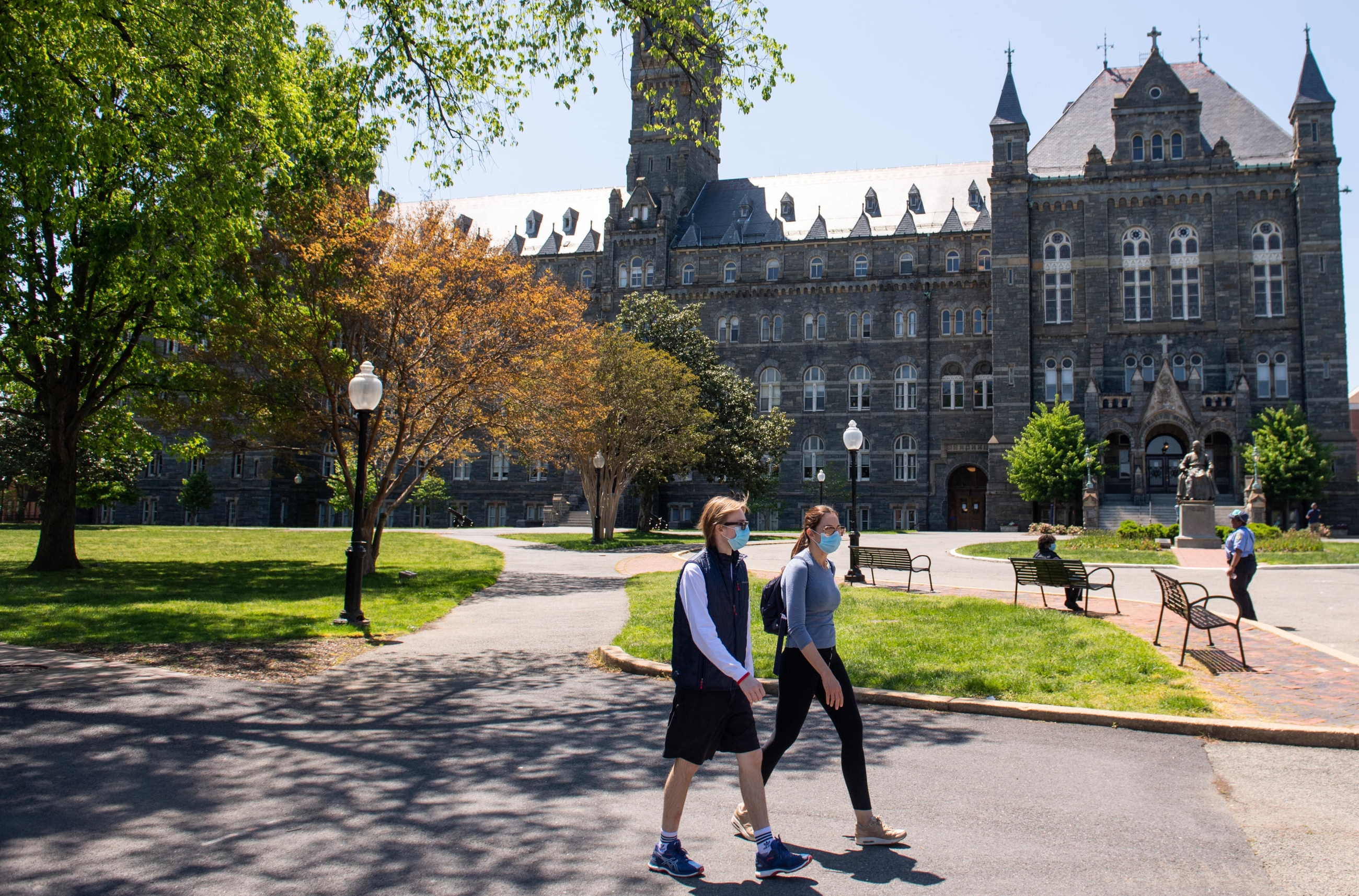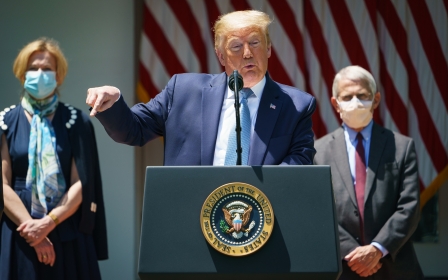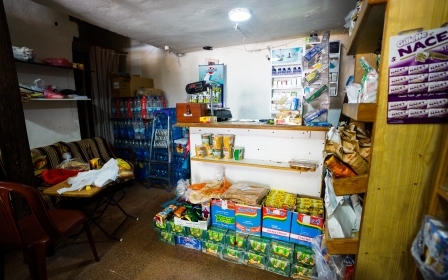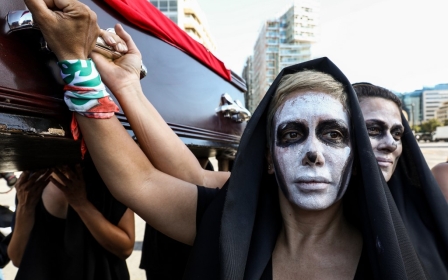'Returning to Lebanon is not an option': Students face new crisis in US

Salma Hammad has been having recurring nightmares over the past week.
"I am dreaming of planes. I am dreaming of paperwork. I am dreaming of petitions. I suddenly feel so vulnerable," Hammad, who asked for her name to be changed, told Middle East Eye.
Like tens of thousands of her fellow international students in the United States, the 28-year-old PhD student at City University of New York is trying to understand what the new visa directive from President Donald Trump will mean for her.
According to the Immigration and Customs Enforcement (ICE) ruling, if the plan goes ahead, international students on F1 and M1 visas would lose their right to live and study in the US if their classes were to move online, a measure at least nine percent of colleges and universities have decided to take amid the coronavirus pandemic.
More than 360,000 students were enrolled in American colleges and universities in 2019 on visas affected by the rule change.
The lack of clarity has left many international students, already living precariously during an unprecedented global economic meltdown that has shadowed the pandemic, at a loss over their options.
Many have leases to honour and outstanding loans to pay, study and work plans made for the next year - all of which have come to a standstill. Some who are midway through degree programmes are being told to transfer to new universities, even as colleges continue to grapple with the ever-shifting contexts of the virus.
According to the Institute of International Education, there are about 81,000 international students from the Middle East and North Africa at US universities. Among them, in the 2018-9 academic year, there were an estimated 1,600 students, including Hammad, from Lebanon.
For those from countries and regions either embroiled in conflict or in economic or social upheaval, the ruling could not have come at a worse time. It has left Hammad on edge, confused and angry.
"I am in the third year of my PhD programme, and going back to Lebanon when it’s all just falling apart right now is just not an option," Hammad said.
'State of limbo'
Lebanon is in the midst of a full-blown economic crisis with an increasingly unstable currency that has deepened this year. Not only are ordinary people enduring long and frequent power cuts, they face skyrocketing inflation and shortages in essential goods, including food and fuel.
"There is nothing to go back to, and I was just feeling so dependent on the US - and now hearing these developments has only added to the state of limbo," Hammad said.
With the Trump administration making it a clear goal to have a stronger grip on immigration, I think this kind of put everyone in the position that they always had to think that, at any point, something could happen.
Haya Ghandour, student
Another Lebanese student, Rola Itani, a 24-year-old PhD candidate at the University of California, San Diego, told MEE that although her university said they would be adopting a hybrid model - including a part-in-person and part-online teaching structure - she is not sure what would happen to her visa status should the university suffer a Covid-19 outbreak and switch to remote learning.
"Transferring to a school offering in-person instruction is obviously not an option for a PhD student, especially not mid-year," said Itani, who also asked for her name to be changed.
"And even if it's remote, where will I go?"
But even then, Itani’s situation, like many students, is a little more complex.
In an attempt to save money as the economic shutdown in the US came into effect in June, Itani went across the border into Mexico, where costs are significantly cheaper. She said she expects to return after the crisis subsides, hopefully for the semester starting in September.
With the new directive from ICE, it is not clear if and when she can return to the US. Meanwhile, in order to be eligible to get back into the country, she has to wait for her university to send her an updated I-20 form that will clearly state: “The school is not operating entirely online, that the student is not taking an entirely online course load for the Fall 2020 quarter, and that the student is taking the minimum number of online classes required to make normal progress in their degree program."
Without that, her F1 visa will not be renewed.
"I can’t apply for visas to other countries because embassies are shut down due to the pandemic, while I only have a limited amount of time to stay here," Itani said.
'Happening so fast'
The spectre of not being able to return to the US is shared by another Lebanese student, Haya Ghandour, a 19-year-old civil engineering student at Columbia University.
"The situation is pitiless. There's a complete disregard for our lives
- Rola Itani, student
In March, as the pandemic began to sweep across New York City and news began to spread that airports around the world would be closing, Ghandour decided to return to Beirut and be with her family during the health crisis.
The new directive will impact her, too. With the frequent electricity cuts, the difficulty in accessing academic resources, together with the economic meltdown in Lebanon, studying civil engineering online from Beirut was never meant to be a long-term solution.
In September, Ghandour is supposed to be entering the third year of her undergraduate programme.
“Everything was happening so fast, and I had to make a quick decision. I decided to go home and when I arrived, the airport shut down the very next day. And now I don’t know if I can go back,” Ghandour told MEE.
Legal experts and commentators say the directive is inherently political. International students are being made pawns, they say, in a larger play by Trump to force open the US economy. As a result, international students are being forced to make hard choices.
Itani described the administration's decision as "transparent in its brutality".
“The situation is pitiless. There's a complete disregard for our lives,” Itani said.
Panicked calls
Mohammed Saleem, a New York City-based lawyer, told MEE that he has been receiving panicked calls from students to discuss their possible options, and from parents worried their sons and daughters may be arrested by ICE. He said the options are limited and the possibility of deportation is a real one.
On Wednesday, Harvard University and the Massachusetts Institute of Technology (MIT) filed a lawsuit against the ruling, arguing that for many students, "returning to their home countries to participate in online instruction is impossible, impracticable, prohibitively expensive, and/or dangerous".
“Many colleges and universities are carefully watching the Harvard/MIT federal lawsuit filed because amongst the most important types of relief sought in the lawsuit is a 'temporary restraining order' (TRO) preventing ICE from enforcing their policy, which if successful would immediately halt the July 6 Directive,” said Saleem, a partner at Davis Ndanusa Ikhlas & Saleem LLP.
He added: “Harvard and MIT also argue that the ICE policy is 'arbitrary and capricious', as it’s unreasonable and doesn't properly consider important aspects of the problem they will create by forcing colleges/universities to either reopen their classrooms or tell their students to immediately transfer to another college or worse, depart from the US.”
But even if the attempt to stall the ruling is successful, Saleem said, students can expect weeks if not months of anxiety.
Trump's presidency has been characterised by anti-immigrant rhetoric and policy, including the "Muslim ban" in its various incarnations, the deportation of undocumented migrants as well as severe measures at the border with Mexico.
"With the Trump administration making it a clear goal to have a stronger grip on immigration, I think this kind of put everyone in the position that they always have to think that, at any point, something could happen, and they could be put in a place of jeopardy," Ghandour said.
For those directly in the firing line, Trump's message to international students in the American academy has come loud and clear.
"Our academic contributions aren’t valued, our ability to expand knowledge through diversity of experience isn’t valued, our contributions to the richness of our university communities aren’t valued, and our lives and our particular experiences aren’t valued," said Itani, the Lebanese student currently stranded in Mexico.
"It is shocking, but not because it’s surprising. If you know that a fascist is coming to steal you in the night, it doesn’t invoke fear any less and the knowledge of it doesn’t calm your shuddering flesh."
Middle East Eye delivers independent and unrivalled coverage and analysis of the Middle East, North Africa and beyond. To learn more about republishing this content and the associated fees, please fill out this form. More about MEE can be found here.




